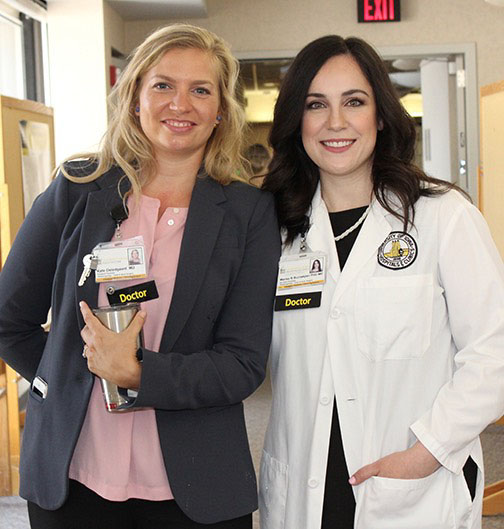 Residency Program
Residency Program
Each year five applicants are chosen to begin their residency here. Three residents are matched to the clinical track (five years) and two residents are matched to the research track (seven years). All residents are required to complete their general surgery internship year at UI Hospitals and Clinics. During the internship year, each resident’s schedule will include a six-month rotation in Otolaryngology.
Resident Research
During the four years of otolaryngology training, each resident enjoys up to two research rotations to explore those aspects of research that are of interest to them.
Clinical Track
The clinical track program includes four years of concentrated clinical study in all aspects of otolaryngology. Residents rotate through the Head and Neck, Otology/Neurotology and Pediatric Services within the clinic during their second and third years. As their skills progress, residents assume responsibility for the services at UIHC and at allied training facilities within Iowa.
Research Track
The research track is designed for the applicant interested in a research career in otolaryngology. After internship, the resident completes two years of research training followed by 4 years of clinical training. The interaction of clinicians and basic scientists from several departments affords the resident the opportunity to be involved in a wide spectrum of research.
This varies from electrophysiology of the auditory system to the genetics of head and neck cancer and gene therapy.
Training Conferences
Basic Science course in Otolaryngology
The PGY-2 resident begins their training with a 6 week intensive Basic Science course. This is divided into an anatomy component allowing the resident to meticulously dissect all structures of the head and neck under staff supervision.
During the remaining five-week lecture series, residents are presented over 120 hours of topics detailing the study of Otolaryngology and all its interrelated disciplines.
Head and Neck Course
Every May or June the “Head and Neck” series of courses is hosted by the Department of Otolaryngology drawing international participants as well speakers regarded as leaders in their specialties. Residents participate in the Head and Neck Course during their third and fifth years.
Functional Endoscopic Sinus Course
This is a two-day course designed to provide information and laboratory experience regarding advanced techniques and approaches in endoscopic sinus surgery. The participants will receive hands-on experience using endoscopic instruments and power instrumentation to perform FESS on fresh cadaver specimens. Fourth year residents attend this course.
The department also hosts an annual Management of the Tinnitus Patient course.
A Team Approach
The team approach was created and implemented not only to expand on the learning capacity for residents, but also to generate more personal time and flexibility. It allows residents to take charge of their patients as part of a continuous care process and ultimately results in more surgical experience earlier in their training.
The Department recognizes the importance of a healthy work/life balance. Residents enjoy more time to study and/or free time as a result of the team approach. Weekly working hours are capped and limited to ensure the well–being of our residents.
House Staff Benefits
Medical Care
As a service to residents, the UIHC provides comprehensive medical, dental and hospital care for house staff physicians, dentists and their dependents.
Counseling services
The UIHC recognizes that graduate medical and dental education places increasing responsibility on house staff members and requires sustained intellectual and physical effort. It is further recognized that for some these demands will at times cause emotional or physical stress. In all such instances, house staff physicians, dentists and members of their immediate families are encouraged to seek help. In that regard, a list of contacts and resources is provided.